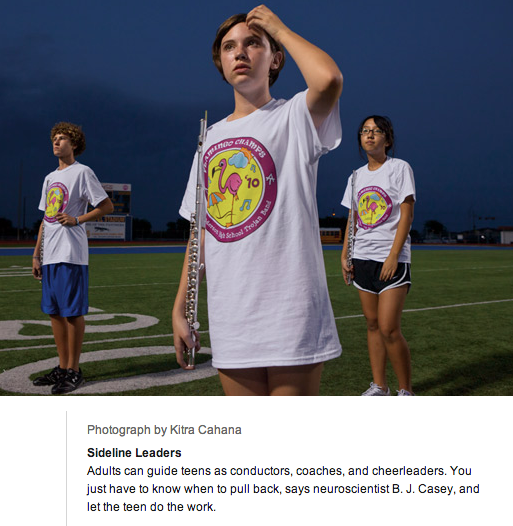 The Office of Population Affairs has a series of tutorials that are helpful. I pointed readers to this website when we looked at Social Media and Brain Development.
The Office of Population Affairs has a series of tutorials that are helpful. I pointed readers to this website when we looked at Social Media and Brain Development.http://www.hhs.gov/opa/familylife/tech_assistance/etraining/adolescent_brain/Development/prefrontal_cortex/index.html
 |
| This series is worth a look |
The Teen Brain: It's Just Not Grown Up Yet : NPR
Mar 1, 2010 – Jensen is a Harvard expert on epilepsy, not adolescent brain development. As she coped with her boys' sour moods and their exasperating ...COMMENT: This interview evolved from a National Geographic article.
Teenage Brains - Pictures, More From National Geographic Magazine
ngm.nationalgeographic.com/2011/10/teenage-brains/dobbs-textThe first full series of scans of the developing adolescent brain—a NationalInstitutes of Health (NIH) project that studied over a hundred young people as they ...The Teenage Brain - National Geographic Magazine - NGM.com
ngm.nationalgeographic.com/print/2011/10/teenage-brains/dobbs-textThe first full series of scans of the developing adolescent brain—a NationalInstitutes of Health (NIH) project that studied over a hundred young people as they ...National Geographic's October 2011 Article, "The New Science of ...
www.breakingthecycles.com/.../national-geographics-october-2...Oct 6, 2011 – This article, “The New Science of the Teenage Brain,” by David ... October 2011 National Geographic magazine is well worth the read. ... the teen brain's physical development [see image, as example] and its activity patterns.Beautiful Brains - National Geographic | WYMAN
wymancenter.org/the-beautiful-teenage-brain-highlighted-in-the-national...Oct 18, 2011 – National Geographic highlight on the complexity of the humanbrain. ... The Beautiful Teenage Brain – Highlighted in the National Geographic... extremely necessary to help brains complete their development into adulthood.
=======HowStuffWorks "Teenage Brain Development"
science.howstuffworks.com/life/teenage-brain1.htmTeenage brain development is like an entertainment center that hasn't been fully hooked up. Learn about teenage brain development and the prefrontal cortex.Sarah-Jayne Blakemore: The mysterious workings of the adolescent ...
www.ted.com/.../sarah_jayne_blakemore_the_myste...Sep 17, 2012Why do teenagers seem so much more impulsive, so much less self-aware than ... typically “teenage” behavior ...- More videos for brain development of teenagers »
Work In Progress - Adolescent Brains Are A Work In Progress ... - PBS
www.pbs.org/wgbh/pages/frontline/shows/teenbrain/.../adolescent.htmlAs the prefrontal cortex matures, teenagers can reason better, develop more control over impulses and make judgments better. In fact, this part of the brainhas ...Overview of Adolescent Brain Development
www.hhs.gov › ... › OAPP Adolescent Brain DevelopmentOverview of Adolescent Brain Development. Over the past 25 years, scientists and researchers have made enormous strides in the area of brain functionality ...Adolescent Brain Development
www.hhs.gov/opa/familylife/tech_assistance/.../adolescent_brain/Adolescent Brain Development self-directed module.NIMH · The Teen Brain: Still Under Construction
www.nimh.nih.gov/health/.../the-teen-brain-still-under-construction/An understanding of how the brain of an adolescent is changing may help explain.... This last question has been the central reason to study brain development ...The teenage brain | Science News for Kids
www.sciencenewsforkids.org/2012/10/the-teenage-brain/Oct 17, 2012 – By peering into the brains of teenagers, scientists who study brain development have begun finding answers. The evolved teenager.Dream Online: The teenage brain - Children's Hospital Boston
www.childrenshospital.org/dream/summer08/the_teenage_brain.htmlTwo discoveries prompted much of their scientific interest: that teenagers' brains are only about 80 percent fully developed and that brain development isn't ...Scientists unravel the mysteries of the teenage brain - Telegraph
www.telegraph.co.uk › Science › Science NewsMay 15, 2013 – So by the use of imaging and other tools we can really tap into these features of the adolescent brain and understand how they develop over ...
Dan Heath points out that "to make a change in behavior, we often need to SEE it, so we can FEEL it, to get the energy to MAKE the change."
Dan Heath: Want Your Organization to Change? Put ... - YouTube
www.youtube.com/watch?v=JhBzxy7CneM
Sep 17, 2010 - Uploaded by FastCompany
Making Strategy Simpleby FastCompany 5,488 views; 2:13. Watch Later Readitfor.me Trailer: Switch by Chip ...Why Change Is So Hard - YouTube
www.youtube.com/watch?v=RpiDWeRN4UA
Sep 17, 2010 - Uploaded by FastCompany
Dan Heath: Want Your Organization to Change? Put Feelings Firstby FastCompany 15,552 views; 2 ...CONFIRMATION BIAS (links to items by Dan Heath)
We tend to confirm what we know
I wonder if reading this list of articles might be a way of letting kids know that "If you just survive the next ten years, you'll wake up with a fully developed brain and then you can decide whether or not to try this risky actions..."
Well, we know that an article is read more closely when there are photos, so here are some photos from the Oct. 2011 magazine article by National Georgraphic.
Thanks for reading so far. See more photos here...












